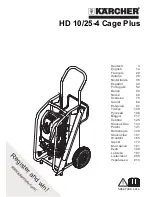
Refer to the Stain Removal Chart for treatment of specific stains.
If an entire item is heavily soiled or very stained, it may be both
easier and more effective to prewash the item before laundering
than to pretreat every spot.
Prewashing
Prewash excessively soiled clothes, such as work or children’s
clothes.
They often get very soiled. Prewashing with detergent will help
loosen the soil.
Laundry aids
Detergents are the most popular cleaning agents for home
laundry.
Using too little detergent results in poor wash quality, while
using too much causes excessive suds and poor rinsing.
Detergents not only remove soil, but also hold it in suspension
in the wash water to prevent redepositing it on the wash load.
The amount to use depends on wash load size, amount of soil,
water hardness and detergent type.
ALWAYS measure the amount of detergent.
The amount
of suds formed is not necessarily an indication of how much to
use. Some detergents form a great amount of suds, others
only a few. Use only detergents suitable for front loading
washers.
LAUNDRY AIDS
1.
Use only low sudsing detergent.
2.
The degree of soil will change detergent amounts. For heavier
soiled loads, increase the amount of detergent used.
3.
If water is extremely hard, detergent should be increased.
Less detergent should be used in soft water.
4.
If garments have been pretreated, decrease the amount of
detergent. If garments have ben heavily pretreated, it may not
be necessary to add detergent.
5.
If the previous machine owned was a top loader, the initial
washloads in a front loader may require a reduced quantity of
9
Instructions for installation and use
Starting the washer-dryer
After installing your new washer-dryer, start a wash cycle by setting a desired program .
always check that:
1. The door is closed
correctly.
2.
The plug is secured in the
socket.
3.
The water supply is turned
on.
4.
Selector knob
A
is
positioned on one of the
RESET
positions.
Choose the desired program
The program is selected
according to the type of
garments that need to be
washed. To choose a program,
refer to the table on page 11,
then:
1)
turn
Washer
knob until the
selected program is aligned
with the mark on the knob,
2)
turn
Dryer
knob to the
desired position,
3)
Set the
Wast Temp
knob to
the appropriate Wash/Rinse
temperature settings,
4)
if necessary use buttons
E, F,
G, H
and lastly, press the
Power button.
5)
Remember that, if you want
to use it, the
"programmed
start"
should be set before the
wash cycle.
At the end of the wash cycle...
Mode+Door Lock light will
flash fast for a few seconds,
and then flashes slowly.
Then turn the washer-dryer off
by pressing
Power
button
(
O
position). You can now
open the washer-dryer door
safely. After having removed
the freshly cleaned laundry,
leave the door open to allow
air circulation inside the drum.
Remember that, in the event
of a power failure, or should
the washer-dryer switch
itself off, the program chosen
will remain in memory.
Starting your washer-dryer in
the right way is important for
the quality of your wash, to
help prevent future problems
and enhance life expectancy
of your appliance. Once you
have loaded your washer-
dryer and added the detergent
together with any fabric
conditioner,
For more delicate
garments:
protect underwear, tights
and stockings and
delicate items by placing
them in a canvas pouch
detergent until the detergent remaining in the clothes is
removed. Old detergent trapped in the garments will be released
during the tumble action wash cycle.
For quantities of detergent to be used, refer to the detergent
manufacturer’s instructions on the box.
Detergent will be flushed automatically into the machine from
the detergent dispenser. The suds level should never rise more
than halfway up to the porthole. Too much foam will not impede
the wash action of your machine but will rise through the
detergent dispenser and make a mess on the floor !
If this should happen clear excessive suds by setting the
timer to the beginning of the first rinse and allow the
machine to rinse out.
Bleaches
Bleach functions to whiten clothes, remove certain problem
stains, to deodorize and in some cases to sanitize; however
bleaching is not a substitute for good laundry techniques. Bleach
should never be added to the rinse water. Always dilute bleach
before using.
To add bleach, open detergent dispenser door and pour in
compartment
4
(see page 12 and 11-10).
WARNING:
Under no circumstances overfill the bleach dispenser. Excessive
bleach will run directly into the machine and may possibly
damage the clothes.
Fabric Softener
All fabrics, particularly towels, benefit from the use of fabric
conditioners in the final rinse. Items of laundry feel softer, are
more easily ironed and the clinging affect of synthetics is
considerably reduced.
Pour the softener into “Additives” compartment of the detergent
dispenser to the level indicated on the syphon. Under no
circumstances overfill, as the softener will immediately syphon
into the machine and in so doing, impair the wash results.








































